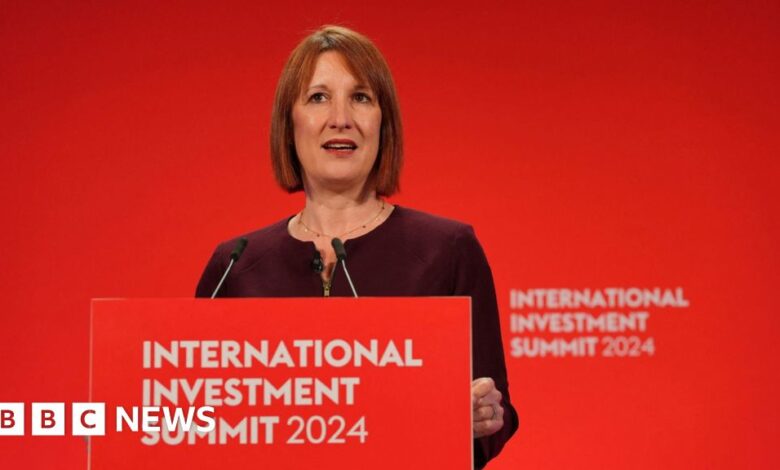Rachel Reeves eyes £40bn in tax rises and spending cuts in Budget

Chancellor Rachel Reeves is looking to make tax rises and spending cuts to the value of £40bn in this month’s Budget, government sources have told the BBC.
At a political cabinet meeting on Tuesday, Reeves told ministers that filling the “£22bn black hole inheritance from the previous government” would only be enough “to keep public services standing still”.
Reeves is now drawing up plans to find £40bn in order to avoid real-terms cuts to departments, sources say, as first reported in the Financial Times and the Times.
Reeves warned ministers there would be “difficult decisions on spending, welfare, and tax” to come in her Budget this month.
The chancellor is finalising details of her first Budget, to be announced on Wednesday 30 October.
She recently said there would be “no return to austerity” under this government and promised a boost to government investment, designed to kickstart growth.
The chancellor is setting herself a borrowing rule which means all day-to-day spending should be funded from taxes raised, not from borrowing.
It is this rule which is binding the government’s hands, and why they are seeking some welfare savings as well as a series of tax rises at the Budget.
A HM Treasury spokesperson said: “We do not comment on speculation around tax changes outside of fiscal events.”
In an interview with BBC Breakfast on Tuesday, the Prime Minister, Sir Keir Starmer, did not rule out a National Insurance increase for employers in the Budget.
Paul Johnson, director of the Institute for Fiscal Studies, told the BBC Radio 4’s Today programme the “very big hole in public finances” had been long known about, but was downplayed during election campaigning earlier this year.
He suggested that some of the £40bn would most likely be covered by “slight changes in the fiscal rules” or by tax rises proposed by the government already.
“If they are looking for £20bn or £30bn of tax rises, in the end they will have no choice but to do something with income tax.”
Treasury officials are reportedly exploring National Insurance on employer pension contributions to raise Budget revenue.
Employers pay NI at a rate of 13.8% on all employees’ earnings above £175 per week, but pension contributions made by employers are currently exempt from the levy.
The prime minister side-stepped questions over whether Labour’s manifesto promise not to raise taxes for “working people” covered employers’ NI too.
The Labour Party’s 2024 manifesto ruled out raising taxes for “working people”, such as National Insurance, income tax and VAT.
On Monday, Reeves said Labour’s election pledge not to increase NI on “working people” related to the employee element, as opposed to the sum paid by employers.
Leading business groups in the UK raised concerns over the potential tax rise, warning that it would “hobble” economic growth and “hammer” the hospitality sector.
The £40bn figure is much higher than government has previously acknowledged, as ministers come to terms with the economic reality of delivering on their promise that there will be “no return to austerity”.
So why mention it now? To mentally prepare the public for tax rises to come, and begin to set the parameters as to what to expect.
The prime minister has talked about how those with the “broadest shoulders” should bear the “heaviest burden”.
There are two weeks to go until we see what that means. There will no doubt be plenty more pitch-rolling in the days ahead.




